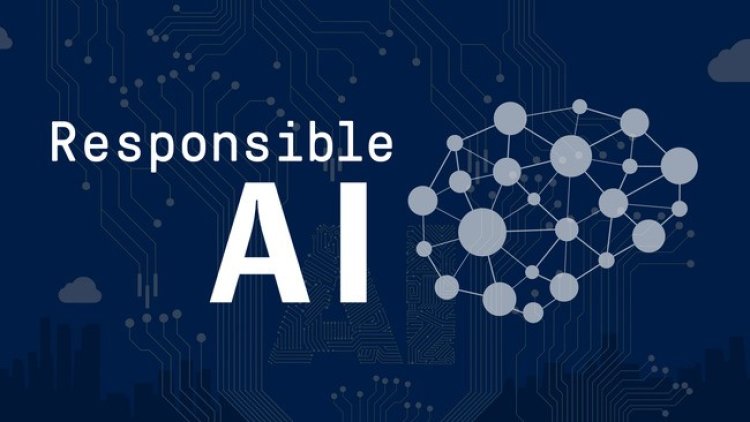Responsible AI Explained: A Guide to Ethical AI Use
Discover the principles of Responsible AI in our guide, ensuring ethical use of artificial intelligence for a better future. Learn how to implement it responsibly!
Share this Post to earn Money ( Upto ₹100 per 1000 Views )

As artificial intelligence (AI) continues to permeate various aspects of our lives, the importance of ethical considerations in its development and deployment has become increasingly critical. Responsible AI is a concept that emphasizes the need for AI systems to be designed and used in a manner that aligns with societal values, legal standards, and ethical norms. This article explores the principles of Responsible AI, its significance, and how organizations like EthosAI are leading the charge in promoting ethical AI practices.
Understanding Responsible AI
Responsible AI refers to the development and deployment of AI technologies that prioritize ethical considerations and human well-being. This approach seeks to mitigate risks associated with AI, such as bias, discrimination, lack of transparency, and privacy violations. It encompasses various principles, including:
1. Fairness: AI systems should treat all users equally, without bias or discrimination. This requires careful consideration of the data used to train AI models to ensure that they do not inadvertently perpetuate existing inequalities.
2. Transparency: Users should understand how AI systems make decisions. This means that organizations must provide clear explanations of their algorithms and the data driving their decisions, allowing users to trust and verify the system's outputs.
3. Accountability: Developers and organizations must be accountable for the outcomes of their AI systems. This includes establishing clear lines of responsibility and ensuring mechanisms are in place to address any negative impacts caused by AI.
4. Privacy: Respecting user privacy is paramount. AI systems should handle personal data responsibly, ensuring compliance with data protection laws and implementing robust security measures to protect user information.
5. Safety and Security: AI systems must be designed to prevent harm and ensure user safety. This includes rigorous testing and validation to identify and mitigate potential risks before deployment.
The Importance of Responsible AI
The need for Responsible AI has grown as AI technologies become more widespread. From healthcare to finance, AI applications can significantly impact individuals and society. Ethical missteps can lead to serious consequences, such as perpetuating discrimination in hiring practices or violating user privacy through inadequate data protection measures.
Organizations that prioritize Responsible AI can build trust with their users and stakeholders. By committing to ethical practices, they can enhance their reputation, attract talent, and ensure compliance with emerging regulations. Moreover, responsible practices can lead to better decision-making and improved outcomes, ultimately benefiting both organizations and society as a whole.
EthosAI: Leading the Way in Responsible AI
EthosAI is at the forefront of advocating for Responsible AI practices. With a mission to promote ethical AI use, EthosAI focuses on developing tools and frameworks that enable organizations to adopt Responsible AI principles effectively. Their initiatives include:
-
Education and Training: EthosAI offers training programs and resources to help organizations understand the ethical implications of AI and implement Responsible AI practices within their teams.
-
Guidelines and Best Practices: By providing comprehensive guidelines, EthosAI assists organizations in developing AI systems that prioritize fairness, transparency, and accountability.
-
Collaboration and Advocacy: EthosAI collaborates with industry stakeholders, policymakers, and researchers to shape the conversation around ethical AI use and promote regulatory frameworks that support Responsible AI.
Implementing Responsible AI in Organizations
Organizations looking to implement Responsible AI should consider the following steps:
1. Establish an Ethical Framework: Develop a clear ethical framework that outlines the organization’s commitment to Responsible AI principles. This framework should guide decision-making processes and inform the design and deployment of AI systems.
2. Conduct Impact Assessments: Before deploying AI systems, conduct thorough impact assessments to identify potential risks and ensure that ethical considerations are integrated into the development process.
3. Engage Stakeholders: Involve diverse stakeholders, including employees, users, and community representatives, in discussions about AI deployment. Their insights can provide valuable perspectives on ethical concerns and potential impacts.
4. Invest in Training: Provide training for employees on Responsible AI practices, ensuring they understand the ethical implications of their work and are equipped to make informed decisions.
5. Monitor and Evaluate: Implement ongoing monitoring and evaluation processes to assess the performance of AI systems and address any ethical concerns that may arise post-deployment.
Conclusion
As AI continues to evolve, the importance of Responsible AI cannot be overstated. By prioritizing ethical considerations in the development and deployment of AI technologies, organizations can mitigate risks and build trust with their users. EthosAI plays a crucial role in promoting Responsible AI practices, offering resources and support to help organizations navigate the complexities of ethical AI use. By adopting Responsible AI principles, we can harness the full potential of AI while safeguarding our values and ensuring a positive impact on society.















